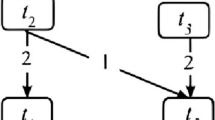Abstract
Devising an efficient workflow scheduling algorithm is paramount to explore high performance from Heterogeneous Computing Environments. In this paper, two scheduling algorithms are proposed to minimize the schedule length. A novel list-based heuristic scheduling algorithm namely Global Highest degree Task First (GHTF) algorithm is proposed which focuses on increasing the degree of parallelism to reduce the makespan. The proposed heuristic based Branch and Bound strategy namely Critical Path/Earliest Finish Time (CP/EFT) algorithm is devised to schedule workflows to optimality while minimizing the time complexity for evaluating each state in the search space. The GHTF algorithm has shown improvement in the schedules with no additional overhead in computations. Experimental results disclosed that GHTF algorithm generated better schedules by 5–20 percent while CP/EFT algorithm improved the schedules by 10.76–23.45 percent compared to classical list scheduling algorithms. Moreover, CP/EFT algorithm outperformed GHTF algorithm by 5 percent.









Similar content being viewed by others
Explore related subjects
Discover the latest articles and news from researchers in related subjects, suggested using machine learning.Data availability statement
The data described in this article is available at Workflows.
References
Arabnejad H, Barbosa JM (2014) List scheduling algorithm for heterogeneous systems by an optimistic cost table. IEEE Trans Parallel Distrib Syst 25(3):682–694. https://doi.org/10.1109/TPDS.2013.57
Daoud MI, Kharma N (2008) A high performance algorithm for static task scheduling in heterogeneous distributed computing systems. J Parallel Distrib Comput 68(4):399–409. https://doi.org/10.1016/j.jpdc.2007.05.015
Gary MR, Johnson DS (1979) Computers and intractability: a guide to the theory of NP-completeness. W.H. Freeman and Co., San Francisco
Falzon G, Li M (2012) Enhancing list scheduling heuristics for dependent job scheduling in grid computing environments. J Super Comput 59(1):104–130. https://doi.org/10.1007/s11227-010-0422-2
Illavarasan E, Thambidurai P (2007) Low complexity performance effective task scheduling algorithm for heterogeneous computing environments. J Comput Sci 3(2):94–103. https://doi.org/10.3844/jcssp.2007.94.103
Jonsson J, Shin KG (1997) A parameterized branch-and-bound strategy for scheduling precedence-constrained tasks on a multiprocessor system. In: Proceedings of the International Conference on Parallel Processing. Bloomington, IL, pp 158–165
Kasahara H, Narita S (1985) Practical multiprocessor scheduling algorithms for efficient parallel processing. IEEE Trans Comput 33(11):1023–1029. https://doi.org/10.1109/TC.1984.1676376
Khan MA (2012) Scheduling for heterogeneous systems using constrained critical paths. J Parallel Comput 38:175–193. https://doi.org/10.1016/j.parco.2012.01.001
Kohler WH, Steiglitz K (1974) Characterization and theoretical comparison of branch-and-bound algorithms for permutation problems. J ACM 21(1):140–156. https://doi.org/10.1145/321796.321808
Kruatrachue B, Lewis T (1988) Grain size determination for parallel processing. IEEE Softw 5(1):23–32. https://doi.org/10.1109/52.1991
Fujita S (2001) A branch-and-bound algorithm for solving the multiprocessor scheduling problem with improved lower bounding techniques. IEEE Trans Comput 60(7):1006–1016. https://doi.org/10.1109/TC.2010.120
Sirisha D, Vijayakumari G (2016) Minimal start time heuristics for scheduling workflows in heterogeneous processing systems. Distrib Comput Int Technol Springer Lecture Notes Comput Sci 9581:199–212. https://doi.org/10.1007/978-3-319-28034-9_27
Sirisha D, Vijayakumari G (2016) Exploring the efficacy of branch and bound strategy for scheduling workflows on heterogeneous computing systems. Procedia Comput Sci 93:315–323. https://doi.org/10.1016/j.procs.2016.07.216
Topcuoglu H, Hariri S, You WY (2002) Performance-effective and low-complexity task scheduling for heterogeneous computing. IEEE Trans Parallel Distrib Syst 13(3):260–274. https://doi.org/10.1109/71.993206
Vempaty NR, Kumar V, Korf RE (1992) Depth first vs best first search. In: Proceedings of the of 9th National Conference on AI, AAAI-92. San Jose, CA University, pp 545–50
Kwok Y, Ahmad I (2005) On multiprocessor task scheduling using efficient state space search approaches. J Parallel Distrib Comput 65:1515–1532. https://doi.org/10.1016/j.jpdc.2005.05.028
Zhang W, Korf RE (1991) An average case analysis of branch and bound with applications: summary of results. In: Proceedings of the 10th National Conference on AI, AAAI-91. CA University, pp 434–40
Kwok Y, Ahmad I (1999) Static scheduling algorithms for allocating directed task graphs to multiprocessors. ACM Comput Surv 31(4):406–471
Djigal H, Feng J, Lu J, Ge J (2021) IPPTS: an efficient algorithm for scientific workflow scheduling in heterogeneous computing systems. IEEE Trans Parallel Distrib Syst 32(05):1057–1071. https://doi.org/10.1109/TPDS.2020.3041829
Zhou N, Qi D, Wang X, Zheng Z, Lin W (2017) A list scheduling algorithm for heterogeneous systems based on a critical node cost table and pessimistic cost table: list scheduling algorithm based on CNCT and PCT. Concurr Comput Pract Exp 29(5):e3944. https://doi.org/10.1002/cpe.3944
Quan Z, Wang Z, Ye T, Guo S (2020) Task scheduling for energy consumption constrained parallel applications on heterogeneous computing systems. IEEE Trans Parallel Distrib Syst 31(5):1165–1182. https://doi.org/10.1109/TPDS.2019.2959533
USC Epigenome Center. http://epigenome.usc.edu
Graves R, Jordan TH, Callaghan S, Deelman E, Field E, Juve G, Kesselman C, Maechling P, Mehta G, Milner K (2011) Cybershake: a physics-based seismic hazard model for Southern California. Pure Appl Geophys 168(3–4):367–381
Alebrahim S, Ahmad I (2017) Task scheduling for heterogeneous computing systems. J Supercomput 73(6):2313–2338. https://doi.org/10.1007/s11227-016-1917-2
Djigal H, Feng J, Lu J (2019) Task scheduling for heterogeneous computing using a predict cost matrix. In: Proceedings of the 48th International Conference on Parallel Processing Workshop
Maurya AK, Tripathi AK (2018) On benchmarking task scheduling algorithms for heterogeneous computing systems. J Supercomput 74(7):3039–3070. https://doi.org/10.1007/s11227-018-2355-0
Author information
Authors and Affiliations
Corresponding author
Ethics declarations
Conflict of interest
The authors declare that they have no conflicts of interest.
Additional information
Publisher's Note
Springer Nature remains neutral with regard to jurisdictional claims in published maps and institutional affiliations.
Rights and permissions
About this article
Cite this article
Sirisha, D. Complexity versus quality: a trade-off for scheduling workflows in heterogeneous computing environments. J Supercomput 79, 924–946 (2023). https://doi.org/10.1007/s11227-022-04687-x
Accepted:
Published:
Issue Date:
DOI: https://doi.org/10.1007/s11227-022-04687-x
Keywords
Profiles
- D. Sirisha View author profile




